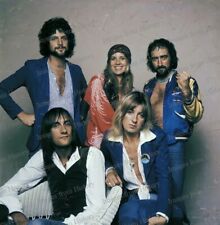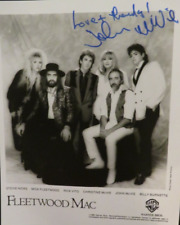|
Courier Mail (Australia), February 28. 1993 Lindsey Buckingham knows more than anyone what drove megagroup Fleetwood Mac. He tells Neil Melloy about his struggle with band members, who placed money-making ahead of musical artistry FOR 12 years, Lindsey Buckingham was widely considered the driving force behind supergroup Fleetwood Mac.
The band had been around before Buckingham joined, but it was with his penmanship that the band achieved their greatest success. Now the guitarist is back with a solo album and some emotional baggage left over from his sudden departure from Fleetwood Mac.
Despite phenomenal success with the band, Buckingham claims he was unhappy because the group's aim at times was just to make money.
The release of a multi-CD compilation of the best of the band's 25-year output, and a solo album by Buckingham, have placed the band's busiest period under the spotlight again.
The band reformed at the request of President Clinton, who had used their tune, Don't Stop, as his election theme.
The album, Rumours, became one of the biggest rock albums ever, staying at the No. 1 position on the American charts for more than six months. The band that formed in 1967 has sold tens of millions of records in its lifetime.
Much of that is credited to Buckingham. When Mick Fleetwood, Christine and John McVie and Stevie Nicks were joined by Buckingham, the Fleetwood Mac sound was formed. Buckingham was the creative driving force behind the band.
And Christine McVie once noted that ""if Lindsey were to leave, it wouldn't be Fleetwood Mac".
Five months after those fateful words, Buckingham packed his guitar and left, resulting in the cancellation of their Australian tour. Now he claims the group that roared to the top of the charts, and continued without him, had virtually fired him.
The 43-year-old Buckingham is quietly spoken and relaxed these days, much as he was in the band, even when those around him were losing their heads. Nicks, whom he separated from while still in the band, had drug and alcohol problems before straightening out. The McVies separated, and despite megabuck album sales, Mick Fleetwood went bankrupt.
Now, living in the hills of Los Angeles, Buckingham has just released his third solo album.
The album is called Out Of The Cradle, taken from a poem by Walt Whitman.
Buckingham is astute enough to realise that within a group there must be compromises, but he feels they went too far.
Perhaps the saddest aspect is that Buckingham feels his musical talents were over-ridden by the band in pursuit of the dollar.
""On a musical level, I think there were priorities," he said.
""The group would probably dictate that the priority would be to sell records. That was never something that I felt should be the main priority.
""Having been involved in a situation like Rumours, that was mega successful on a commercial level, I was fortunate enough to be able to see that that was a double-edged sword, that you get notoriety and you get certain creative freedom, and certainly financial benefits out of that.
""But the other side of that is that people want to label you as one thing, and machinery gears up behind that. That has to do not only with the record company, but to some degree, in my case, other band members, and certainly the audience. They all want to see you do what they understand, and see you do it over and over."
Buckingham said the experience was soul-deadening, and became worse when he tried to change direction with the follow-up album, Tusk. It confounded a lot of people's expectations, and while selling enough millions to make any struggling band delirious, it wasn't enough to please the rock dinosaurs of Fleetwood Mac.
""There was a backlash after it was clear that it wasn't going to sell 60 million again, mainly from the band," he said.
""It was a double album, it sold about five million and so I guess it's pretty relative. But they were saying "well Lindsey, you're not going to do that again'.
""After it become clear that wasn't something the band felt comfortable with, I started working on solo albums as an outlet for the left side of my vocabulary."
He said he felt confined, and working with a group of people who appeared to just be eager moneymakers.
It was while he was working on his third solo album in 1987 that problems began to surface.
He had completed songs such as Big Love, which eventually appeared under the Fleetwood Mac banner.
But the band were saying it was time to produce another group album. Disunity was rapidly becoming a problem.
""By that time there were five managers, and it was hard to get everyone in the room at the same time," he said.
According to Buckingham, he took on the role of peacemaker and agreed to use his material on the Mac album and work as a family, despite the difficulties.
""I think we saw Stevie maybe five days out of a year," he said.
""I realised towards the end of that time that it was probably the last thing I would do. I didn't really say I'm leaving.
""I went over to Christie and said I just couldn't go on the road.
They said they'd get somebody else to go on the road, so in essence I guess you could say I was fired."
There was not much point continuing with the band, Buckingham said, but claims his relationships with the other band members are fine now, despite some tension and bitterness initially.
He has even seen Nicks a few times recently, which is an achievment, because they were not talking at all a few years ago.
""All the chemistry which was such an integral part of what we were, that's all still there. I'm always glad to see them," he said.
After letting the emotional dust settle for a year, he began work on Out Of The Cradle, which took three years to complete.
The new album is much more guitar-oriented and marks the real Lindsey Buckingham.
""But it's not the kind of album people are going to pick up on right away," he said.
""It was the first time I'd had the chance to make the kind of album I wanted to make. It was challenging, but it was very cathartic at the same time."
Buckingham says he defines himself through his work, and making this record has had a calming effect on him.
""I'd left a situation which was not really a creative situation anymore," he said. ""Now I'm reclaiming some happiness and creativity."
|









